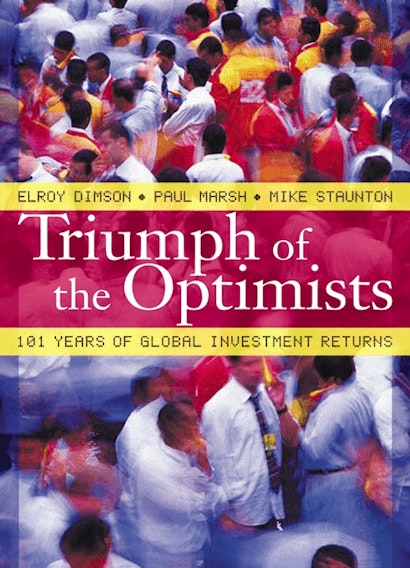Investors have too often extrapolated from recent experience. In the 1950s, who but the most rampant optimist would have dreamt that over the next fifty years the real return on equities would be 9% per year? Yet this is what happened in the U.S. stock market. The optimists triumphed. However, as Don Marquis observed, an optimist is someone who never had much experience. In Triumph of the Optimists, renowned investment authorities Elroy Dimson, Paul Marsh, and Mike Staunton extend our experience across regions and across time. They present a comprehensive and consistent analysis of investment returns for equities, bonds, bills, currencies, and inflation, spanning sixteen countries, from the end of the nineteenth century to the beginning of the twenty-first. This is achieved in a clear and simple way, with over 130 color diagrams that make comparison easy.
Crucially, the authors analyze total returns, including reinvested income. They show that some historical indexes overstate long-term performance because they are contaminated by survivorship bias and that long-term stock returns are in most countries seriously overestimated, due to a focus on periods that with hindsight are known to have been successful.
The book also provides the first comprehensive evidence on the long-term equity risk premium—the reward for bearing the risk of common stocks. The authors reveal whether the United States and United Kingdom have had unusually high stock market returns compared to other countries. The book covers the U.S., the U.K., Japan, France, Germany, Canada, Italy, Spain, Switzerland, Australia, the Netherlands, Sweden, Belgium, Ireland, Denmark, and South Africa.
Triumph of the Optimists is required reading for investment professionals, financial economists, and investors. It will be the definitive reference in the field and consulted for years to come.
Elroy Dimson is professor of finance and cofounder and chairman of the Centre for Endowment Asset Management at the University of Cambridge Judge Business School. Paul Marsh is professor emeritus of finance at London Business School. Mike Staunton is professor emeritus of finance and director of the London Share Price Database at London Business School.
"Brilliant."—Jason Zweig, Time
"By far the most important investment book in years. . . . It is the best and most complete source of data yet available. . . . If you spend an hour with it and don't learn anything worth the price then you're truly lousy at learning about markets. . . . Right now, buying this book makes more sense than buying stocks."—Ken Fisher, Bloomberg Money
"A model of how investor research should be carried out. . . . Like most great books, Triumph of the Optimists has us saying 'Wow!' and 'Unbelievable!' with startling regularity. . . . This is a book that belongs on every investor's bookshelf."—Victor Niederhoffer and Laurel Kenner, MSN.com
"[Triumph of the Optimists] suggests that the recent blind adherence to the cult of the equity needs to be questioned and that the strategic weighting of bonds in institutional portfolios should be increased."—Philip Coggan, Financial Times
"Connoisseurs of financial history will find plenty to enjoy in Triumph of the Optimists. . . . The evidence produced by Mr. Dimson and his colleagues is striking. . . . A provocative lesson."—Matthew Lynn, Financial Times
"Our favorite book on global stock market performance. . . . [It] epitomizes outstanding investment research. . . . Unless intelligent life is discovered on another planet and a stock market is found to have been operating there for some centuries, it is unlikely that much new data can be brought to bear on the issue of long-run stock returns. Triumph of the Optimists may well be the last word on the subject for some time to come."—Active Trader magazine
"This will become the definitive empirical basis for analysis of the world's capital markets over the twentieth century. It is an important work of scholarship; no one else has calculated the equity premium of a large number of countries over the long term. In doing so, the book contributes to the very lively debate on the magnitude of the equity premium and will make a splash."—William Goetzmann, Yale University
"Recent years have seen unprecedented public interest in the stock market, but there is a tendency for investors to concentrate on recent U.S. stock market performance. Progress in understanding financial markets requires a much longer timeframe and a global perspective. This book presents and analyzes data from many countries in a simple, standardized way that makes comparisons easy. It makes a number of extremely important points and goes well beyond simple summaries of average returns and historical volatilities to look at such issues as seasonality and industrial structure."—John Campbell, Harvard University
"No investor can afford to risk a penny in the markets without studying this book and absorbing its fascinating lessons. That advice applies whether you are professional or amateur, a youngster or hardened from experience, bold or conservative. This book is history at its most challenging and illuminating. The facts are astonishing, the presentation dazzling, the analysis brilliant, and the lessons profound."—Peter L. Bernstein, author of Capital Ideas and Against the Gods
"This is an important addition to the investment literature and will be widely used by both the academic and business community. To have the scope of data and analysis contained in this book available in one place represents a major contribution and improvement over what is now available."—Martin J. Gruber, New York University

